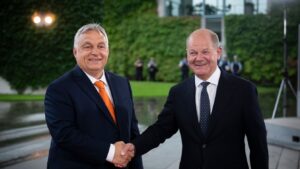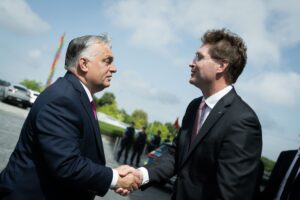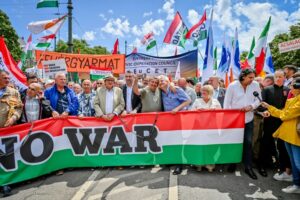Prime Minister Viktor Orbán Discusses German-Hungarian Relations, Economic Transformation, and Europe’s Political Future
In a recent comprehensive interview, Hungarian Prime Minister Viktor Orbán shed light on several crucial topics, ranging from the burgeoning economic ties between Hungary and Germany to the broader political dynamics within the European Union. The interview, rich in detail and strategic insights, underscores Orbán’s vision for Hungary’s role in a rapidly changing Europe.

Strengthening German-Hungarian Economic Ties
Orbán began by highlighting the robust economic relationship between Hungary and Germany, epitomized by Mercedes-Benz’s significant investment in Kecskemét, Hungary. This investment will generate over 300,000 jobs and position Hungary as a pivotal player in the German auto industry’s technological transformation. Orbán emphasized that major German companies, including Mercedes, are undergoing substantial technological changes, and Hungary is poised to be a key beneficiary. These developments promise to integrate Hungary more deeply into the German industrial framework, fostering economic growth and job creation.

The Importance of Open Markets
Addressing broader economic concerns, Orbán articulated the dangers of economic protectionism, stressing that Hungary’s prosperity hinges on open global markets. He warned against the growing protectionist sentiment in Europe, arguing that it would be disastrous for Hungary, a nation reliant on exporting its manufactured goods. Orbán asserted that both Hungary and Germany, being production-centric economies, share a vested interest in maintaining an open world economy to sustain their high living standards.

Political Landscape in Europe
Orbán then shifted focus to the political arena, critiquing the current coalition of the European People’s Party (EPP) with left-leaning forces, which he described as detrimental to Hungary’s interests. He expressed concerns over the EPP’s shift towards leftist alliances, which he believes undermines right-wing politics and the interests of conservative voters. Orbán lamented the pro-war and pro-migration stance of this coalition, suggesting that it diverges significantly from the preferences of Hungarian citizens and many European conservatives.

Hungary’s Position on War and Peace
Much of the interview was dedicated to Hungary’s stance on the ongoing conflict between Russia and Ukraine. Orbán reiterated Hungary’s commitment to peace, contrasting it with what he perceives as the pro-war agenda of other European leaders. He highlighted the extensive human and economic costs of the war, advocating for a strategy of isolation and containment rather than escalation. Orbán’s recent negotiations ensured that Hungary would not participate in NATO’s military mission in Ukraine, underscoring his dedication to keeping Hungary out of the conflict.

Migration Policies and European Identity
On migration, Orbán maintained his firm stance against accepting large numbers of migrants, arguing that it would irrevocably alter Hungary’s cultural and social fabric. He criticized the current European leadership’s approach to fast-tracking citizenship and family reunification for migrants, warning that such policies are transforming the demographic landscape of countries like Germany. For Orbán, preserving Hungary’s identity and cultural heritage is paramount, and he urged Hungarians to resist pressures to conform to broader European migration policies.

Conclusion
Prime Minister Viktor Orbán’s interview provides a detailed look at his strategic priorities and concerns. From economic cooperation with Germany to navigating the complexities of European politics and maintaining national sovereignty, Orbán’s perspectives are crucial for understanding Hungary’s current and future trajectory.
To delve deeper into Orbán’s insights and views, we invite you to watch the full interview video.
